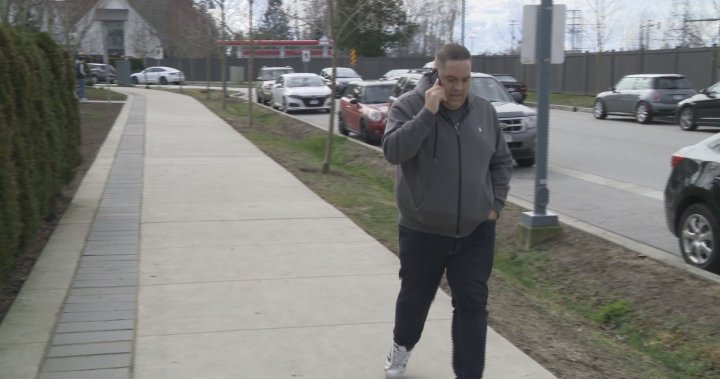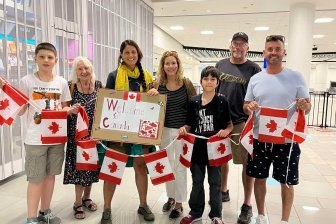A Tsawwassen, B.C., man says he could have died waiting for an ambulance after suffering a stroke.
Layne French, 36, was driving through the Massey Tunnel on March 13 when the stroke happened.
He said he was sitting in some traffic when he coughed, then felt a pain on his right side and what felt like a kick to the back of the head.
“At first I thought it was just an optical illusion,” he said, while he attempted to blink away the moving ground.
“But then it just kept going and I was like, ‘This is not good. This is not good’. And as I’m driving, I start to feel (the right) side of my body freeze. I’ve lost control of it.
“And I just feel it starting to slide and (slump down). And now I can’t tell if it was or not, but I had no control over it. And then my eyes were just slowly drifting towards the passenger floorboard. And I remember this vividly thinking in my head, ‘This is not good. What’s happening’.”
French said he was going 80 km/h, and he was in the Massey Tunnel with traffic all around him.
“Right at the base of my neck, I hear this ticking sound, tick, tick, tick,” he said.
French said this caused his vision to drift and snap back about three or four times.
“What’s going on here, it’s total fear,” he said.

Somehow, he said he made it out of the Massey Tunnel but the entire right side of his body was frozen and he started applying the brake, causing cars behind to honk.
“Eventually I’ve stopped and the person behind me is laying on the horn,” French said.
“And I just tried to reach with (my right) arm and it’s completely frozen.
“Eventually… I grab (and) I squeezed the gearshift as hard as I can, slamming (it) into park. I couldn’t get hazards on and couldn’t do anything. And then I knew I was in trouble in trying to turn it off.”
The latest health and medical news
emailed to you every Sunday.
The latest health and medical news
emailed to you every Sunday.
French said everything was spinning. He managed to open the door and stumble out into oncoming traffic, waving his arm.
“Somebody realized that I’m not okay,” he said.
French stumbled to the car behind him and managed to convey to the woman that he needed an ambulance.
“I can’t see anything but… the centre, we normally would have concentration, it’s completely out,” he said. “And, you know, it’s still swirling and I can’t see anything.”
As the other driver called 911, French stumbled back to his car to try and get his cellphone to call 911. He said he couldn’t see but he was able to activate Siri to call 911.
“They said the paramedics are coming. They hung up. And an-hour-and-a-half later, no one showed up. No police, no fire, nothing.”
Again with the help of Siri, French was able to call his work and tell them to call his wife. She was able to call his parents who were flying in to YVR and French was on his way to pick them up at the time of the medical emergency.
His parents landed, picked up their bags, cleared customs, caught a cab to the Steveston off-ramp, picked up their son and drove with him to Richmond Hospital.

French said dispatch had told him that he should drive himself to the hospital, even though he told them he couldn’t as he couldn’t see.
Another time dispatch had called back, saying they were trying to get a paramedic in a minivan but then called back again saying that wouldn’t be possible and again offered him the choice to drive himself.
“That’s the problem is I feel like at the time I need the system, I was abandoned,” he said.
“Nobody cared… I’m in the middle of the highway. I just had a stroke.
“I’m shocked that this all happened in Metro Vancouver. You know where the care is the greatest.”
French said he has lost faith in the medical system.

However, his journey to see a doctor and receive care didn’t end when he got to the hospital.
French said he arrived at the hospital around 6:30 p.m. and it wasn’t until 1 a.m. that he first saw a doctor.
He had his first CT scan without contrast around 2:30 a.m. and then received a second one with contrast around noon the following day.
It was then he was told he had suffered a stroke.
“I had a blood clot and it’s a high likelihood that I’m going to have a massive secondary stroke,” French said.
He won’t know how much damage he has suffered until he gets an MRI, but he doesn’t yet know when that will be.
“It was devastating to think I had a stroke while driving a car at 80 km/h… that it was devastating to realize when this all happened and I reported this and I was talking to them, that somebody on the other side was not putting two and two together that this was actually a stroke,” French said.
B.C. Emergency Health Services did not respond to questions about why an ambulance was never dispatched to French’s emergency.

Michael Hill, a professor for the Departments of Clinical Neurosciences, Community Health Sciences, Medicine and Radiology at the University of Calgary, told Global News that stroke patients need to be seen in a hospital right away.
“Speed is the critical factor here,” he said.
“On average, every 10 minutes delay it makes a difference to the outcome.”
Hill said it is critical that people understand that they have to react quickly and use the acronym F.A.S.T. to help recognize a stroke. The letters (Face, Arms, Speech, and Time) can help determine someone has suffered a stroke and get them help quickly.
French knows he is lucky to be alive but this situation has changed his outlook on the medical system.
“I have this long belief that when you truly need it, mistakes like this are not going to happen,” he said.
“World-class health care is something that we’ve always been proud of as Canadians and I think the problem I have is that this was a clear case of I seriously needed help.”










